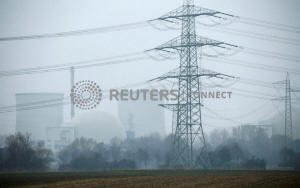Does renewables pioneer Germany risk running out of power?
 Send a link to a friend
Send a link to a friend
 [July 18, 2019]
By Vera Eckert [July 18, 2019]
By Vera Eckert
FRANKFURT (Reuters) - Germany, a poster
child for responsible energy, is renouncing nuclear and coal. The
problem is, say many power producers and grid operators, it may struggle
to keep the lights on.
The country, the biggest electricity market in the European Union, is
abandoning nuclear power by 2022 due to safety concerns compounded by
the Fukushima disaster and phasing out coal plants over the next 19
years to combat climate change.
In the next three years alone conventional energy capacity is expected
to fall by a fifth, leaving it short of the country's peak power demand.
There is disagreement over whether there will be sufficient reliable
capacity to preclude the possibility of outages, which could hammer the
operations of industrial companies.
The Berlin government, in a report issued this month, said the situation
was secure, and shortfalls could be offset by better energy efficiency,
a steadily rising supply of solar and wind power as well as electricity
imports.
Others are not as confident, including many utilities, network
operators, manufacturing companies and analysts.

Katharina Reiche, chief executive of the VKU association of local
utilities, many of which face falling profitability as plants close,
said the government's strategy was risky because it had not
stress-tested all scenarios. She characterized the plan as "walking a
tightrope without a safety net".
Utilities and grid firms say if the weather is unfavorable for lengthy
periods, green power supply can be negligible, while storage is still
largely non-existent. Capacity aside, the network to transport renewable
power from north to south is also years and thousands of kilometers
behind schedule, they add.
Stefan Kapferer, head of Germany's energy industry group BDEW, said it
would be risky to rely on imports. "Conventional power capacity is
falling nearly everywhere in Europe and more volatile capacity is being
built up," he told Reuters.
The government rejected such concerns, saying the likelihood of plant
crashes or identical weather conditions across Europe was remote.
Regardless of reliability, however, Germany becoming a net power
importer would have major consequences for the whole continent, whose
power markets are interlinked under EU single market rules - and are
dominated by exports from Germany.
The shift comes at a time when nuclear plants in France, another major
exporter to the rest of Europe, are ageing fast - meaning it is also
increasingly likely to rely on imports.
Searing summer temperatures rising to record levels in parts of Europe
highlight a quandary facing the continent: how to phase out the fossil
fuels driving global warming, while avoiding power shortfalls in an era
when there could be increasing spikes in demand from cooling systems and
expanding data centers.
COMPANIES ON EDGE
Germany, Europe's economic powerhouse, should lose 12.5 gigawatts (GW)
of coal capacity by 2022 and its final 10 GW of nuclear power, leaving
below 80 GW of conventional capacity, according to recommendations from
a government-commissioned panel in January.
There will still be nearly enough reliable capacity to meet the
country's peak demand of around 82 GW, with rising green capacity and
the option of imports providing a comfortable cushion, economy minister
Peter Altmaier said this month.

He was speaking upon the release of a separate government safety
monitoring report which said a one-for-one match of supply and demand is
unnecessary because overcapacities of 80 to 90 GW in the wider European
region provided some leeway for imports into Germany.
However Germany's four transmission system operators (TSO) estimate
there could be a shortfall of 5.5 gigawatts between peak power demand
and reliable capacity in 2021, which equates to the supply of
electricity to 13-14 million people, and that's before factoring in the
bulk of coal plant closures.
Altmaier's position is supported by environmental campaigners who say
some energy producers were playing up the threat of blackouts to protect
their own interests.
"Their motive is obvious," said Green lawmaker and energy expert Oliver
Krischer. "They want to build up pressure to receive payments for
capacities which otherwise would have no chance to come to play in the
market."
Some utilities have asked for compensation for the coal exit plan, with
RWE, Germany's largest electricity producer, wanting up to 1.5 billion
euros ($1.7 billion) per GW to soften the financial hit of plant
closures.
[to top of second column]
|

General view of the nuclear power plant in Biblis near Frankfurt,
Germany March 15, 2016. REUTERS/Ralph Orlowski/File Photo

Regardless of who may be right or wrong, German manufacturers say
they are worried about the prospect of black-outs or even short
outages. They say they can't afford to lose secure flows of
electricity, nor can they survive higher network handling costs that
could accompany more unreliable renewables.
"The early exit from coal-to-power generation fills us with great
concern," Philipp Schlueter, chairman of Trimet, operator of three
aluminum plants in North Rhine-Westphalia state, told Reuters.
"Our aluminum plants need non-stop supply of power at competitive
prices and a stable power grid at all times."
Aluminum maker Hydro Aluminum Rolled Products in Grevenbroich, in
the same western German state, said that plants should only be
closed once alternatives were in place.
"As an energy-intensive industry, we can only go without
conventional energy once renewables are in a position to offer
reliable supply," managing director Volker Backs told Reuters.
North Rhine-Westphalia, also home to other big corporates like E.ON,
RWE, Thyssenkrupp and Bayer, accounts for a third of German gross
domestic product.
Grid operator Amprion, which operates high voltage lines mainly in
that state, says the region will have to rely on power imports from
the early 2020s at the latest.
"Secure capacity goes down continuously until 2020 and there could
be a deficit even before all nuclear reactors leave the grid," CEO
Klaus Kleinekorte told Reuters.
Steelmaker and chemicals industry lobbies also voiced concerns.
Wacker Chemie's CEO has signaled the company could shift some
operations overseas, saying he saw more favorable conditions in the
United States.
BIG QUESTION FOR EUROPE
The problem takes on a European dimension as much of the bloc is
following a trend of reducing reliance on thermal plants and
switching to renewables.

Over the next 10 years, coal-fired and nuclear power plants with a
total capacity of around 100 GW will be shut down in Europe,
equivalent to Germany's thermal power capacity alone, according to
grid operator data.
To counter this, hundreds of gigawatts of offshore wind are planned
to line European coastlines by the end of next decade, according to
the EU's green expansion plans.
Most industry experts agree the transition is needed to combat
climate change, and that within 10 or 15 years there will be
substantial renewable generation to provide reliable cover for the
continent, on the road to carbon neutrality by 2050.
However, they say, a big question remains: how will Europe struggle
through until this happens, keeping the lights on and its businesses
competitive? Countries in similar positions can't all import from
each other.
Germany's rapid and radical shift makes the scenario more
precarious.
German output accounts for around 20% of the European Union's
electricity, with France another 17%, according to figures from
Eurostat, the EU statistics office.
Germany is a net exporter to Austria, Switzerland and Poland and
also the Netherlands, which sends some of the power onwards to
Britain and Belgium. Thus, if Germany alone was to stop reliably
producing surpluses, several parts of the continent could see power
shortfalls - and outages - as a consequence.
There have already been warning signs this year as Germany's net
exports in the first half of 2019 fell by 14%. The situation has
been exacerbated by a European heatwave that drove demand in France
to near record levels in June, curbing its export availability.
Fabian Joas, energy expert at Berlin think-tank Agora, said it would
be a difficult road for most of Europe to meet its goal of
abandoning conventional energy in coming decades.

"But we will be able in the long run to operate a power system based
nearly fully on renewables," he added. "Everyone who understands the
matter agrees on that."
(Additional reporting by Bate Felix, Tom Kaeckenhoff and Daphne
Psaledakis; Editing by Pravin Char)
[© 2019 Thomson Reuters. All rights
reserved.]
Copyright 2019 Reuters. All rights reserved. This material may not be published,
broadcast, rewritten or redistributed.
Thompson Reuters is solely responsible for this content. |